Embarking on the age-old tradition of cigar enjoyment begins with understanding the art of storage. For aficionados and beginners alike, maintaining the perfect environment for your cigars is essential for preserving their flavor and longevity. This introductory guide serves as your compass through the nuanced world of cigar storage, providing practical tips on how to expertly store your prized collection. Discover the secrets behind the ideal humidor conditions, from humidity levels to temperature controls, and learn how to nurture your cigars so that each smoke is as memorable as the last.

Choosing the Right Cigar Humidor:
A Beginner’s Guide
Understanding how to Store Cigars
First and foremost, understanding what a humidor is and its purpose is paramount. A humidor is more than just a box; it’s a sanctuary for your cigars, equipped with devices to regulate humidity, ensuring your stogies are stored in optimal conditions. The guide emphasizes that for beginners identifying a humidor that’s easy to use is key. Don’t get overwhelmed; each humidor essentially fulfills the same fundamental role — preservation of your cigars against the natural enemies like dry air and fluctuating temperatures.
The art of Spanish Cedar wood
When starting in the richly layered universe of cigars, the myriad of cigar humidor options might feel like navigating a labyrinth. Opting for a wood humidor, often crafted from Spanish cedar, is a popular choice due to the wood’s excellent humidity control and its ability to impart a pleasant aroma. This guide suggests that as a novice, choosing a wood humidor is a wise decision, and understanding the nuances of wood options will enhance your selection process. Remember, wood humidors are not just functional; they’re also elegant pieces of craftsmanship that can serve as a decorative element in any room.
Now, the plan for any beginner should be to seek out a humidor that offers the perfect balance between quality and user-friendliness. A humidor with a reliable sealing system is crucial, as it prevents external conditions from affecting the internal environment. The manual recommends verifying if the humidor seals tightly by performing the ‘whoosh’ test, where closing the lid should produce a whoosh sound, indicating a secure seal. In this realm, Spanish cedar humidors are often praised for their superior sealing ability and resilience over time.
Focusing on capacity, beginners might be compelled to choose a size based on current collection size, but it’s wiser to anticipate future growth. A wood humidor with space to accommodate more cigars than you currently possess gives you flexibility as your collection expands. Moreover, a slightly larger humidor provides better air circulation for every cigar. This plan allows your collection to age and mature properly, akin to a wine cellar for your cigars.
The guide further advises that consistent monitoring is essential to maintain the appropriate humidity levels, usually between 68-72%. A beginner’s humidor should come with a reliable hygrometer to keep track of these levels. Don’t fret if you’re just starting out; digital hygrometers are particularly beginner-friendly and offer precise readings to ensure your peace of mind.
In conclusion, for most new cigar smokers, humidors may initially seem complex, but with a clear guide they become less intimidating. As a beginner, armed with this beginner’s guide, the mystery behind choosing the right humidor diminishes. Whether it’s a humidor with high-tech features or a more traditional wood model, your choice should reflect your needs and the level of care you’re willing to invest. Remember, your humidor isn’t just a tool; it’s an extension of the lifelong joy that comes with the cigar experience, safeguarding the taste and aroma that make each smoke memorable. With this plan in hand, you’re ready to embark on the wonderful journey of cigar collecting, cultivating an appreciation for the delicate balance of flavor and craftsmanship that each cigar embodies.
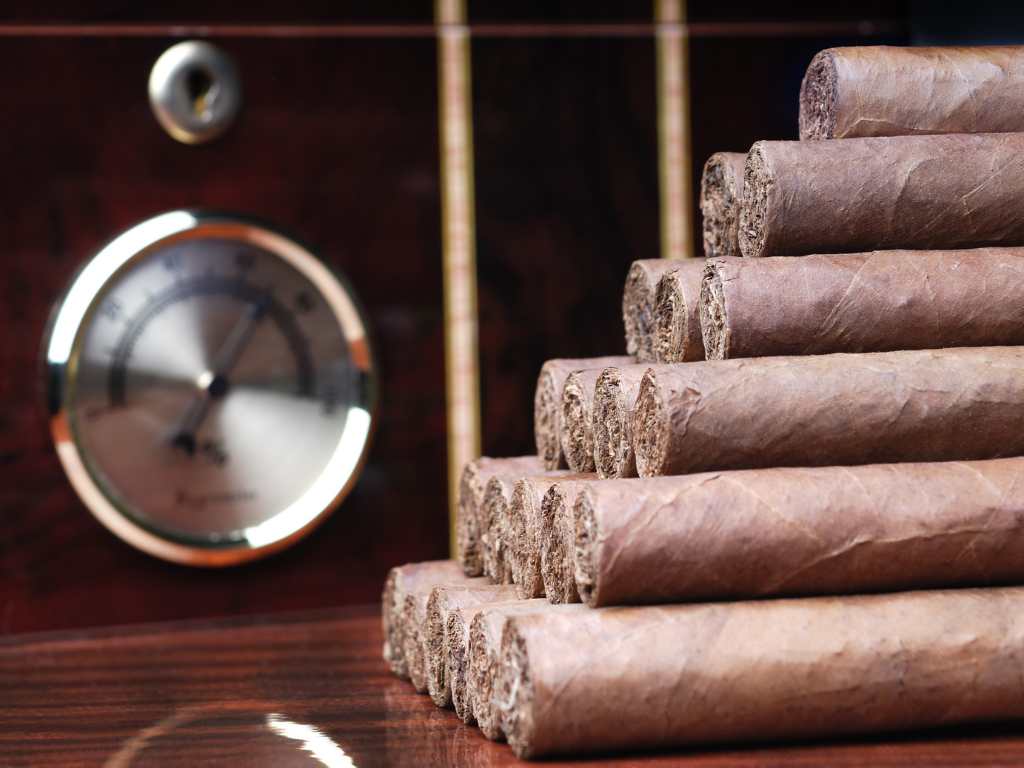
Understanding the Essential Features of Cigar Humidors
At the heart of a humidor’s function is maintaining consistent humidity levels to provide your cigars with the ideal environment they require. Humidors are built to sustain a relative humidity (RH) around 70%, which is the golden standard for cigar humidity levels.
Precise control over humidity is vital, as too much moisture can lead to mold, while too little dries out cigars, causing them to lose their flavor and burn improperly. Innovations in cigar storage have led to the use of hygrometers, which accurately measure the humidity inside the humidor, allowing cigar enthusiasts to monitor and adjust the air’s moisture level as needed.
Manufacturers understand the innate desire for luxury in cigar culture, offering product options that range from simple, functional designs to exquisite pieces that serve as a statement of sophistication. When opting for the more luxurious humidors, it becomes important to consider the manufacturer’s reputation and whether they offer a warranty to back the quality of their product. Ensuring proper airflow inside the humidor is another key feature to consider. Air must circulate adequately to maintain even humidity levels throughout the space. It’s not only about having a static environment but fostering the right balance where your cigars can mature properly.
Whether you’re storing a few cigars or a formidable array, the humidor is the guardian of their longevity and taste. Therefore, beginners should not overlook the importance of a humidor’s features, ensuring that they select a product that will reliably nurture their passion for cigars.
By appreciating the subtleties of maintaining consistent humidity levels, airflow, and the use of quality materials, one can ensure that every cigar remains in its prime, ready to deliver the luxurious experience sought by aficionados around the world.
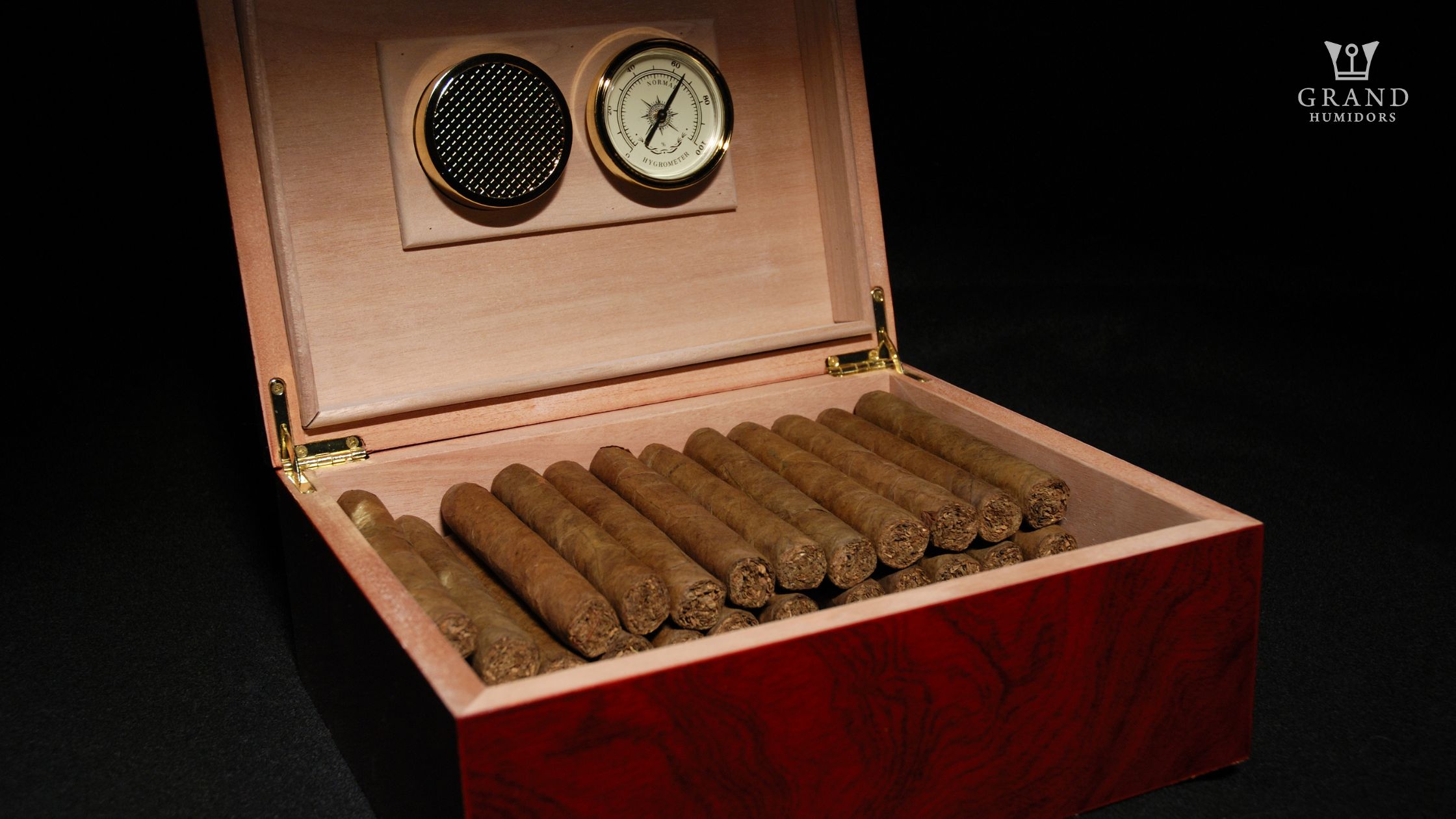
| Type of Humidor | Unique Features |
|---|---|
| Desktop Humidor | – Typically holds 20-100 cigars – Made from wood like cedar or mahogany – Compact, suitable for personal use – Some with glass tops for display |
| Cabinet Humidor | – Larger capacity (hundreds to thousands of cigars) – Often used in shops or by serious collectors – Features multiple shelves and drawers – Equipped with advanced humidification systems |
| Travel Humidor | – Generally holds 5-20 cigars – Portable and often made of durable materials like leather or plastic – Designed to protect cigars during transport – May have built-in hygrometers and humidifiers |
| Walk-In Humidor | – Room-sized, custom-built for commercial or private use – Provides optimal conditions for a large number of cigars – Controlled climate and humidity for long-term storage – Elegant and often an expression of luxury |
| Coolidor | – A converted cooler used as a humidor – Cost-effective alternative to traditional humidors – Large storage capacity for cigars – Maintains consistent humidity levels |
| Electronic Humidor | – Equipped with electronic humidification systems – Accurate temperature and humidity control – May have digital displays and remote monitoring – Suitable for tech-savvy cigar enthusiasts |
| Furniture Humidor | – Integrated into pieces of furniture like end tables or coffee tables – Blends with home décor – Often features exquisite craftsmanship – Combines aesthetics with functionality |
| Acrylic Humidor | – Made from clear acrylic for visibility – Lightweight and break-resistant – Maintains humidity levels effectively – Usually more affordable than wooden humidors |
Setting Up Your First Humidor: More Than Just a Box
When embarking on the journey of setting up your first humidor in your home, it’s crucial to recognize that this box is more than just a simple container; for storing cigars , its a life-preserving vessel for your prized cigars. Acquiring the first humidor ushers you into the world of cigar aficionados where the care and keeping of your cigars are paramount.
To ensure your cigars are maintained in peak condition, balancing the temperature and humidity within your humidor is essential. It’s not merely about selecting a wood type that pleases your eye; the proper temperature of the wood within a humidor – often cedar – plays a critical role in regulating the internal environment and contributing to the aging process of your cigars.
Given that cigars are delicate treasures, the temperature holding humidity in which they storing cigars cannot be too erratic. A constant temperature should be maintained, typically around 70°F, to prevent the cigars from drying out or becoming too moist. Equally as important, the humidity levels must be carefully regulated. The sweet spot for humidity lies between 68% and 72%, a measure that must be covered steadfastly to preserve the cigars’ integrity. This equilibrium prevents them from losing oils and flavors, ensuring that each cigar remains a pleasure to smoke.
The first cigar humidor also signifies a rite of passage. It marks an acknowledgement that cigars are not mere commodities but are entities that deserve respect and proper care. The type of humidor you select – whether it’s a simple wooden box or a more elaborate, feature-laden container – dictates the initial experience of your cigar collection’s home. Beginning with a suitable humidor promises that your foray into cigar collecting and enjoyment will be founded on the right note.
Moreover, humidors come in various sizes and styles. It is more than purchasing a box; it’s about finding a haven that reflects personal aesthetics while also ensuring optimal aging conditions for the cigars. A humidor is the confluence of form and function – a necessary accessory for anyone taking their cigars seriously. When setting up a new humidor however, attention to detail is crucial. From ensuring that the seal is airtight to considering the type of wood lining, like Spanish cedar, for its moisture retention properties and resistance to warping, each aspect must be meticulously covered.
In conclusion, setting up your first quality humidor at home involves more than picking out a pretty box. It demands understanding the nuances of temperature control and wood’s role in safeguarding your cigars.
Additionally, the type of humidor chosen will reflect your personal style and dictate the home of your cigars, making it a centerpiece of your cigar journey. With the right approach and attention to the finer points, such as the temperature maintained and the wood selection, your cigar collection will thrive, with each smoke providing its intended flavor profile and pure enjoyment.
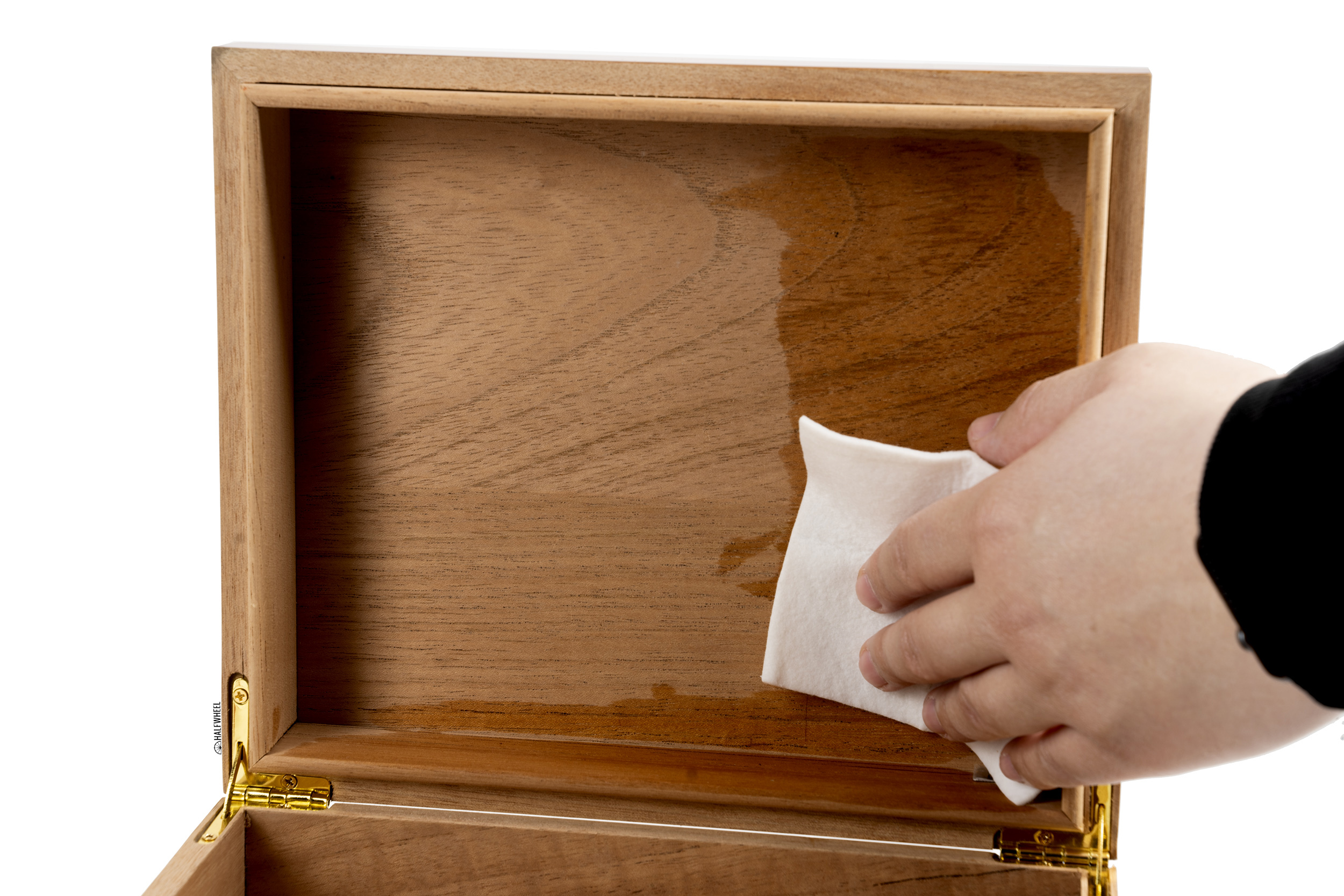
Seasoning a Cedar Humidor for Optimal Cigar Preservation
Maintaining the right environment for your cigars is crucial for their longevity and flavor preservation. A well-seasoned cedar humidor is one of the most effective ways to ensure that your cigars remain at their best. Seasoning is the process of ensuring the cedar wood inside your humidor is adequately humidified before it’s used for cigar storage. This is essential because untreated cedar can absorb the moisture from your cigars, causing them to dry out.
To properly season a cedar humidor, you’ll need a few tools: a humidifier, distilled water, and a reliable hygrometer—avoid tap water as it can introduce minerals and contaminants that can compromise the flavor and storage integrity of your cigars. Begin by lightly wiping the interior cedar wood surfaces of the humidor, including any trays and dividers, with a damp cloth saturated with distilled water. Be cautious not to over-wet the wood to prevent warping; the cedar should be moist, not wet.
Subsequently, fill the humidifier according to the manufacturer’s instructions, usually with distilled water or a specialized solution to maintain the optimal humidity. Then, place the humidifier inside the humidor. It’s critical to monitor the interior conditions of most humidors with a hygrometer, striving for a steady humidity level between 68% to 72% for optimal cigar preservation. Some suggest leaving a small bowl of distilled water within the humidor to assist in elevating the humidity during the initial seasoning—but this should be done with care to avoid over-humidification.
The seasoning process involves patience; it can’t be rushed. Typically, it takes approximately one to two weeks for the cedar to become fully conditioned. During this time, keep the humidor closed and check the hygrometer regularly, adjusting the humidifier as necessary. Remember, your goal is a constant and stable environment.
Once the cedar humidor is appropriately seasoned, it offers a perfect home for your cigars—contributing not just storage but also aiding in age-ripening of the tobacco, enhancing its complexity and character. A quality wooden humidor isn’t just a product; it becomes an integral part of the cigar experience. However, maintenance doesn’t end after seasoning; constant vigilance in a stable room environment is key to optimal preservation. Evolving temperatures and humidity levels in your home can affect the humidor’s internal conditions, so keeping it in a relatively cool, consistent space helps maintain ideal storage circumstances.
In conclusion, seasoning your cedar humidor is a foundational step that cannot be overlooked if you’re serious about cigar preservation. Don’t cut corners—take the time to effectively prepare your storage system for the long-term benefit of your cigars. The cedar’s natural properties, paired with proper humidification and care, contribute significantly to the stable and flavorful condition of every cigar rested within its confines. With a bit of effort and attention to detail, cigar enthusiasts can ensure their collection remains in prime condition, ready to be enjoyed at a moment’s notice.
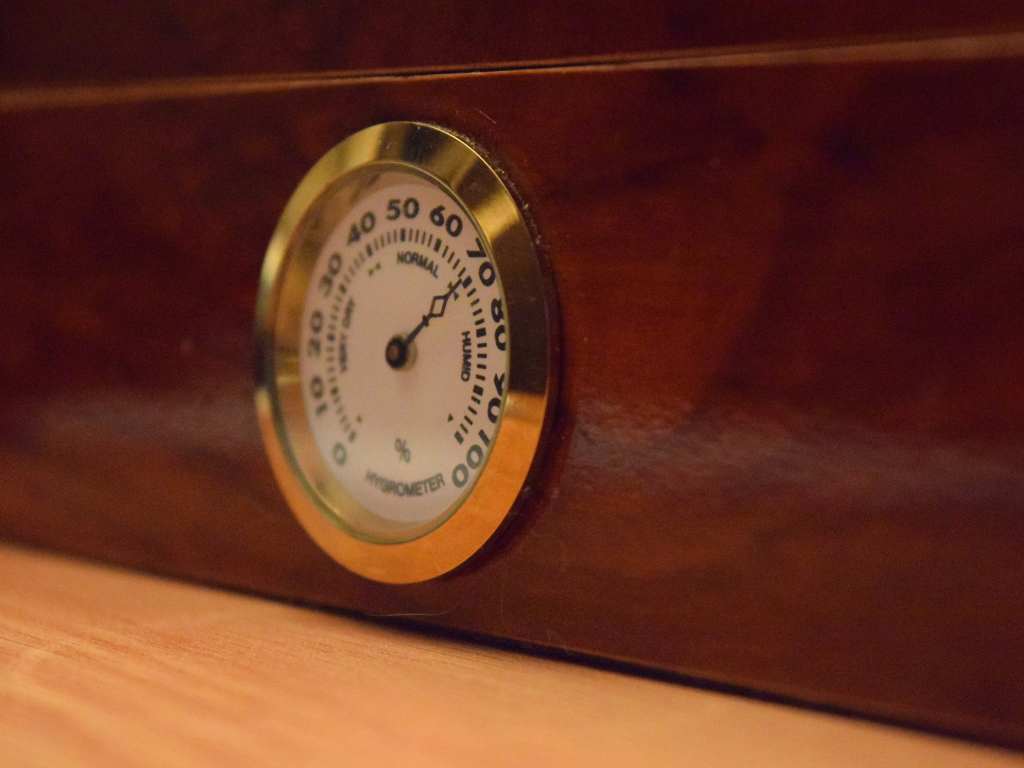
Monitoring Humidity: The Role of a Hygrometer in Cigar Storage
Monitoring humidity is a critical aspect of cigar storage, ensuring that your collection of cigars maintains its quality and flavor. The key to achieving and maintaining the ideal humidity levels lies in understanding the role of a hygrometer. A hygrometer is not just a tool; it’s a guardian that vigilantly oversees the relative humidity within your humidor, keeping your cigars in prime condition. Relative humidity – the amount of moisture in the air compared to the maximum it could hold at that temperature – should be carefully regulated in any cigar club or room dedicated to the art of smoking. For cigars, this perfect range is typically between 65-75% humidity.
Let’s delve into the fundamental importance of a hygrometer in your cigar storage regime. This instrument is essential for monitoring humidity levels precisely, providing peace of mind that the environment where your cigars are kept mimics the tropical climates they originated from. Without a hygrometer, you’d be guessing the moisture content, and with how many cigars around, guesswork simply doesn’t cut it. The hygrometer’s role extends to alerting you when adjustments are needed. Whether it’s refilling the humidifying element or modifying room conditions, the hygrometer helps maintain consistent humidity levels.
Discussing hygrometers further, let’s talk about digital versus analog. Digital hygrometers offer higher accuracy and are generally easier to read, an important feature for those new to cigar storage. Analog hygrometers, while traditional and elegant, may require calibration to ensure accuracy. Whichever type you choose, it’s undeniable that a hygrometer is a fundamental component within your cigar storage toolkit. Frequent checks with a hygrometer ensure that your cigars are not subjected to fluctuating humidity levels that can compromise their integrity and the pleasure of smoking them.
The hygrometer’s role is pivotal in managing your humidor effectively. The art of storing cigars demands vigilance, and whether you have a basic or advanced setup, it’s all about sustaining that ideal humidity. As you get more involved in this hobby, you’ll find that the hygrometer becomes a trusted device, much like a seasoned member of a cigar club who knows the ins and outs of every leaf. When used correctly, the hygrometer facilitates the maintenance of a consistent environment, essential for preventing the over-drying or mold growth that can ruin your prized cigars.
In summary, monitoring humidity with a reliable hygrometer is at the heart of effective cigar storage. It’s not just monitoring humidity levels; it’s creating a sanctuary for your cigars. And while we’ve already discussed the importance of choosing the right humidor and understanding its features, along with the setup and seasoning procedure, the daily vigilance provided by a hygrometer is what truly keeps your cigar collection in impeccable smoking condition. So, make sure you’ve invested in a good hygrometer—it’s as vital as the humidor itself. By closely monitoring humidity with a hygrometer, you can rest assured that your cigars will offer the exquisite experience they were crafted for, every time you light up. The hygrometer’s role cannot be understated—it’s an indispensable ally in the quest for preserving the essence of your cigars.

Maintaining a Seal: Tips to Ensure Your Cigars Stay Fresh
When you’ve taken the plunge to buy a top-notch humidor, understanding how to maintain the seal becomes paramount to protect your investment and keep your cigars fresh. Without a proper seal, your cigars could be compromised, impacting the smoke’s quality and freshness. Ensuring a tight seal is often the difference between a full-flavored, fresh smoke and a dry, lackluster experience. Whether you’re storing a prized pack of samplers or your go-to daily smokes, maintaining the seal can be achieved with these seal tips designed to help beginners navigate the nuances of cigar preservation.
The first aspect to consider is the humidor’s seal quality. To test if a humidor is capable of maintaining a seal, you can perform the “dollar bill test” immediately after your purchase. Open your humidor and place half of a bill inside, letting the other half hang out before you close the lid on it. If you can pull the bill out easily, your humidor’s seal might not be sufficient. In cases of a poor seal, it’s essential to plan for a replacement, buying a higher-quality type designed to lock in humidity more effectively.
For those with an adequate seal, it’s all about persistence in maintaining that necessary barrier. Firstly, when you finish seasoning your cedar humidor, make sure the lip of the seal does not get warped or damaged, as it might not close properly. Using distilled water during the setup process helps to prevent any warping or swelling that can compromise the seal. It’s also important to control the type of space where you place your humidor. Avoid direct sunlight or areas with dramatic temperature changes, as these conditions can affect the humidor’s ability to maintain a seal and, subsequently, its internal freshness.
Moreover, while storing your humidor, it’s advisable not to overfill it. Packing too many empty cigars inside can force the humidor to bulge, which will affect the seal. Plan to buy a humidor that is larger than what you believe you will need, thus allowing some extra space on the top for optimal air circulation and to prevent overpacking which can strain the seal. Furthermore, regularly check your humidor for any cracks or damages, no matter if it’s a type known for durability; wear and tear can occur over time. Prompt replacement of damaged components is vital to maintain the seal.
Ensuring freshness also involves managing the accessories in your humidor, such as the hygrometer and the humidification device. These should be calibrated and replaced when necessary to make sure they’re providing accurate readings. Accurate readings aid in maintaining stability inside your humidor, which supports the integrity of the seal.
In summary, to ensure freshness, a rigorous approach to maintaining your humidor’s seal is required. Investing in a top-tier humidor and employing these seal tips will pay dividends in preserving the fresh taste and ideal condition of your cigars. Regular maintenance and attentiveness to the state of your humidor, coupled with a mindful packing strategy, will ensure that the next time you reach for a cigar, you’ll be greeted with a fresh, flavorful smoke, just as intended.
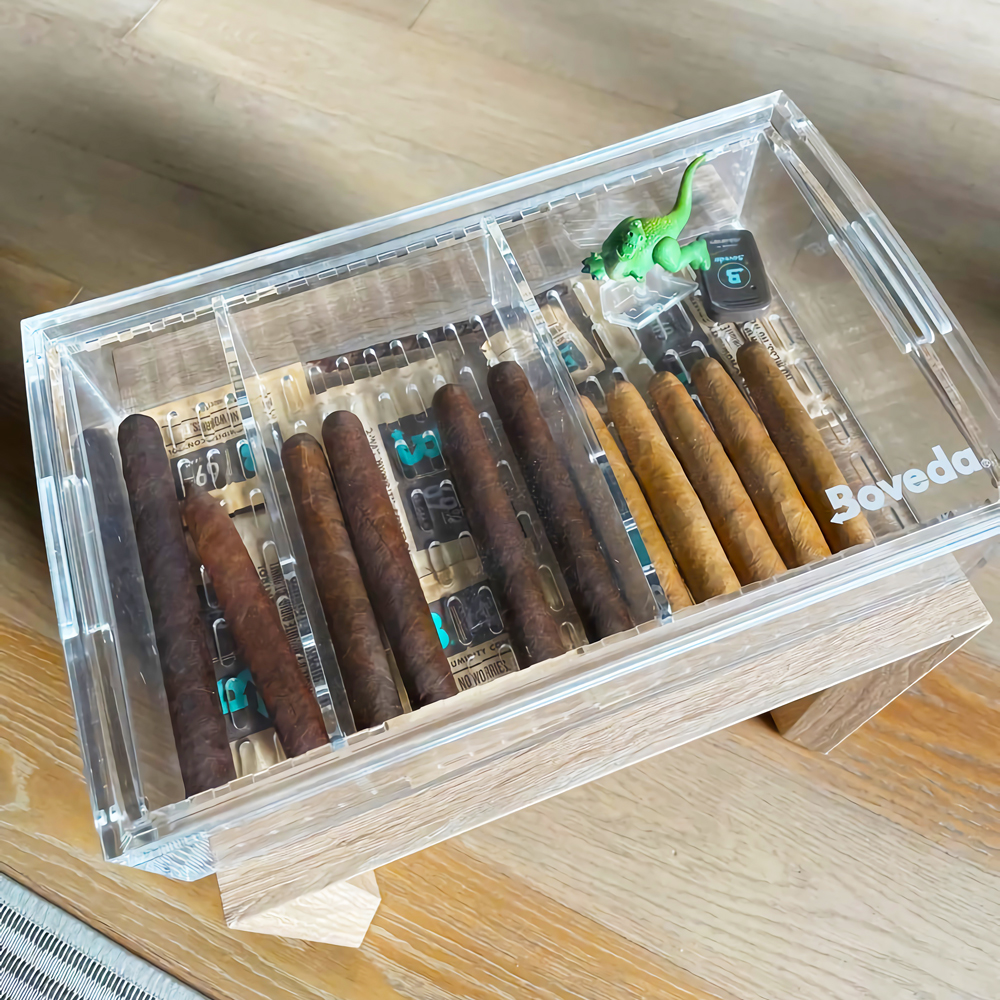
Photo from: Acrylic Custom
Exploring Humidors: From Boveda Bags to Acrylic Jars and More
When you’re venturing into the world of cigar storage, exploring humidors is the cornerstone of preserving your precious collection. As beginners, understanding the nuances of different storage options like Boveda bags and acrylic jars can elevate your experience from mere storage to a ritual of care for your prized cigars. Humidors for beginners need not be an intimidating purchase. Among the plethora of humidors, choosing the right one is akin to picking a home where your cigars will mature and maintain their flavor and essence.
Humidity levels—typically between 65-72% relative humidity—is a critical factor to keep an eye on for any humidor user. Boveda has simplified this with their Boveda bags, which are two-way humidity control packets that automatically regulate moisture inside your humidor, providing a hassle-free solution. Their precision in maintaining the ideal relative humidity can make them a valuable asset for both novice and experienced aficionados alike. Alternatively, acrylic jars offer a more rigid and often clearer option, allowing for visual ease when it comes to monitoring your cigar’s well-being.
Buying a humidor isn’t just about keeping your cigars at the right humidity; it’s about creating a controlled environment where moisture levels work in harmony with your cigars. A humidor is more than just a box—it’s a cigar aficionado’s club. Whether cedar-lined or not, seasoning it is your first step to ensuring the wood doesn’t sap moisture from your cigars. For seasoned smokers or those looking to take the step into more serious collecting, understanding the subtleties of cigar storage, from maintaining a seal to monitoring moisture levels, is paramount to ensure your cigars stay fresh and age to perfection.
Many beginners might think a mere purchase of a humidifier will ensure perfection; however, cigar storage demands more attention to detail. It involves weekly checks on your cigars, perhaps even more frequently if you live in an area with a volatile climate. In addition, there’s always more to learn, like the intricacies of cigar storage, which include maintaining the right moisture levels and knowing when to recharge or replace your humidity sources such as Boveda packs.
Monitoring humidity—and thereby the health of your collection—calls for a reliable hygrometer. These devices, whether digital or analog, are the bouncers of your cigar club, only letting the right level of humidity pass through. Even the best humidors will falter without a diligent eye on internal conditions. This is why maintaining the moisture levels within your humidor cannot be stressed enough. It’s a balancing act where too much or too little humidity can ruin the nuance and character of your cigars.
Whether you’re storing your cigars in the short or long term aging or in Boveda bags or investing in humidors that serve more as permanent homes, each plays a crucial role in the world of cigar storage. The key takeaway for any newbie is this: more knowledge and attention to detail will result in a much more rewarding experience for both you and your cigars. After all, exploring humidors, controlling moisture with Boveda bags, or opting for acrylic jars is more than just preserving cigars; it’s about cherishing and enjoying them to their fullest potential.
Embarking on the journey of cigar collecting can be a deeply rewarding hobby, and with these foundational storage tips and humidor guidance, you’re well on your way to preserving the quality and essence of your cigar collection. Remember, maintaining the right humidity and temperature in travel humidors is critical for your cigars to age beautifully and taste as intended. As a beginner, the world of cigar aficionado may seem complex, but with patience and careful attention to your humidor’s environment, each cigar will offer a memorable experience. Enjoy the process and savor the moments of relaxation with your perfectly preserved cigars.

FAQs
Q: What is the purpose of a humidor?
A: A humidor serves as a sanctuary for cigars, equipped with devices to regulate humidity and maintain optimal conditions, preserving the freshness, flavor, and longevity of cigars against natural enemies like dry air and fluctuating temperatures.
Q: Why is it important to maintain specific humidity levels in a humidor?
A: Maintaining humidity levels between 68-72% is crucial as it prevents cigars from drying out, losing flavor, or burning improperly. Proper humidity levels also protect against mold growth from too much moisture.
Q: How do I know if a humidor has a good seal?
A: A good seal can be tested with the ‘whoosh’ test, where closing the lid of beginner humidor should produce a whoosh sound, showing a secure seal. Alternatively, the “dollar bill test” can be used, where if the bill can be easily pulled out when the humidor is closed, the seal may not be adequate.
Q: What should I consider when selecting the size of a humidor?
A: When choosing a humidor size, it’s wise to anticipate future growth in your cigar collection. A slightly larger humidor than the current collection size is recommended for better air circulation and for allowing the collection to age and mature properly.
Q: How do I properly season a cedar humidor?
A: To season a cedar humidor, lightly wipe its interior with a damp cloth saturated with distilled water, avoiding over-wetting. Then, fill the humidifier with distilled water or a specialized solution and monitor the humidity with a hygrometer for one to two weeks until it stabilizes between 68-72%.
Q: What are the benefits of using a digital hygrometer over an analog one?
A: Digital hygrometers offer higher accuracy and are easier to read, making them beginner-friendly and ensuring precise monitoring of humidity levels within the humidor.
Q: How often should I check the humidity levels in my humidor?
A: It’s recommended to perform weekly checks on the humidity levels in your humidor, or even more frequently if you live in an area with volatile climate changes, to ensure optimal conditions for your cigars.

